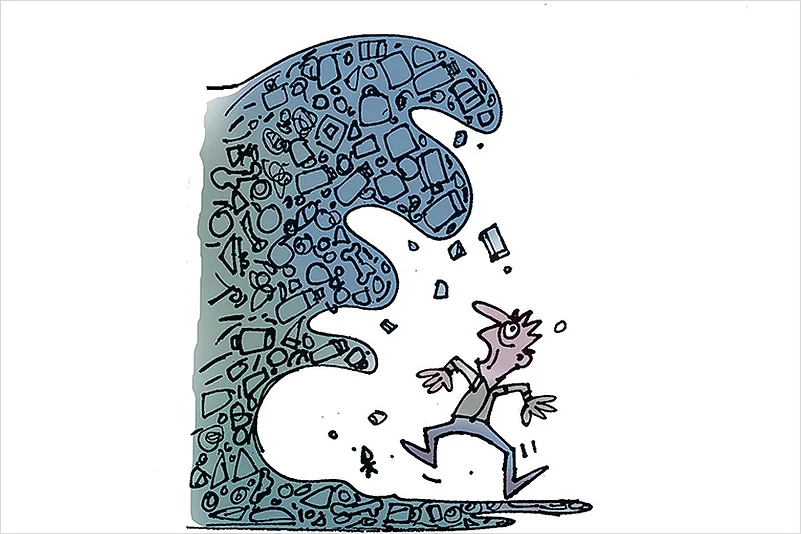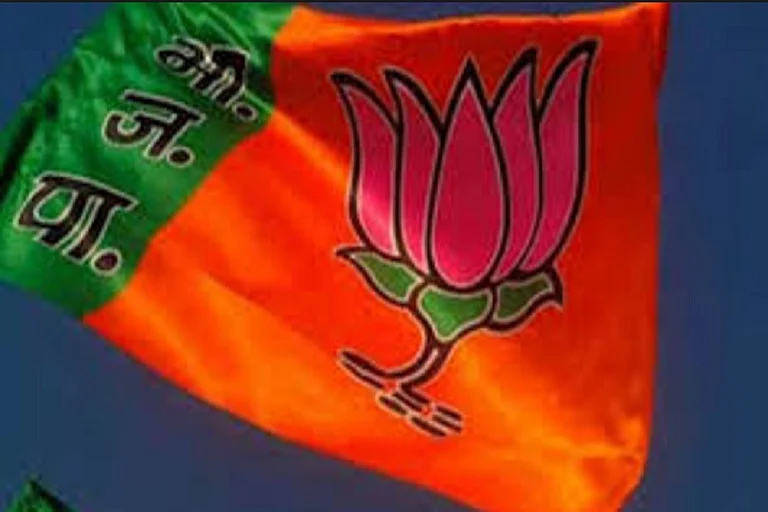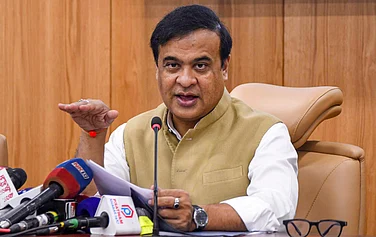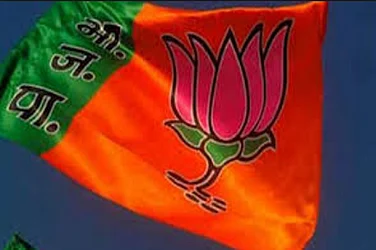Colombo Or Delhi, Garbage Disposal Is A Ticking Crisis
Sri Lanka may have done well to ban plastic bags and some other disposable products last week after the collapse of the country’s biggest garbage dump in Colombo, but it may be a case of too little too late. A part of the dump collapsed in April, crushing homes and killing 32 people. For cities in developing countries, the garbage disposal problem may have reached calamitous levels. In New Delhi, two people died when the city’s biggest landfill in Ghazipur area collapsed due to over-dumping. Currently, the city is struggling with finding new areas to dump its daily garbage—a whopping 10,000 tonnes. Reports suggest that garbage disposal has always been an issue in both Delhi and Colombo, as in other cities around the world, as in the crisis that engulfed Naples last year.

Cops Freeze Telangana Town For National Anthem
On occasion, the State exercises the right to freeze your otherwise fundamental right to ‘freedom of expression’ and demands that you ‘stand up on your feet’ for the national anthem. Now, there are those over-enthusiastic patriots who take it as a challenge to test the outer limits of the state-prescribed dose. In Jammikunta, a town in Telangana’s Karimnagar district, where all townsfolk are expected to leave whatever they are doing and stand to at 7:45 am to a Jana Gana Mana instrumental playing from police loudspeakers in 16 locations. Apart from CCTVs, ‘volunteers’ chosen by cops keep an eye out for any limp-legged detractors. The cherry on the tricoloured cake might be the patriotic Telugu songs that are played for a build-up to the anthem.

HC Says Animals Have Right To Say ‘Leave Us Alone’
The Chhattisgarh High Court recently came out with a thoughtful verdict concerning the often misunderstood question of animal rights in response to a PIL filed by an animal rights activist. It was filed for the release of Sonu, a wild elephant captured by officials of Achanakmar Tiger Reserve in Bilaspur district. “It is part of principles and policies ingrained in Article 39…along with fundamental duties of citizens in terms of Article 59A(g), that we need to recognise...restrictions that humans should maintain: individually, collectively and through institution of governance, against invading life and territories of animals.” Most significantly, it said, “A salutary principle…for proper management of such a scenario is to uphold the right of animals to say ‘Leave us alone’.”

JD(U) Minister Blames Rats For Bihar Floods
Rats have been held responsible for causing a great many diseases over the centuries, but to be blamed for natural calamities like floods…that’s a new one, pulled out as an excuse by JD(U) minister Rajiv Ranjan Singh alias Lalan Singh, Bihar’s Water Resources minister. While reviewing the flood situation last week, Mr Singh claimed that rats had damaged the river embankments, thereby causing the massive floods in Bihar. “Rats are the main reason behind the seepage, especially in the Kamla Balan river embankment,” said the minister, addressing the media. The state’s minister for minor irrigation and disaster management, Dinesh Chandra Yadav, also reiterated Ranjan’s point. “This has been a problem for long, but what can you do? Can anyone claim to forever chase away rats from a place?” was the not-so-heartening statement made by the disaster management minister. Would rat traps do, sirs?

Baba Ramdev To help ITBP
Yoga televangelist and Patanjali founder Baba Ramdev has donned yet another hat. This time around, he is teaching personnel of the Indo-Tibetan Border Security Force (ITBP), often deployed at high altitudes, how to beat stress and keep their minds and bodies strong amidst stand-offs with Chinese troops. “The yoga training is expected to help them maintain optimal mental and physical balance amid aggressive posturing by the Chinese army,” The Telegraph quoted a home ministry official as saying. “Proud of PM Modi, ITBP for showing China its place. I am coming to Delhi to teach yoga skills to ITBP jawans on September 2,” read a tweet by Ramdev last week.
No Signal, No Vote
In the initial days of the mobile phone, when telecom towers were few, people could be seen climbing floors, roofs and even poles to catch an elusive ‘signal’. While now there is an abundance of both mobile phones and their signal towers everywhere, a village in Gujarat’s Amreli district has its people climbing roofs and poles again. And it’s medical emergencies that get the people of Bhenkara the most anxious. So much so that they claim to have threatened the local administration that if the problem isn’t solved, they’d start an agitation and boycott the impending state assembly polls.
Dawood Man As Mayor in Nepal?
Around the turn of the millennium, the Mumbai underworld went international—almost taking cue from globalisation itself—sprouting networks in West and South Asia. Somehow, most networks hark back to Mumbai’s fugitive No. 1—Dawood Ibrahim. Now, the CPN-UML’s candidate running for mayor of Birgunj, a Nepali town near the Indian border at Raxaul, has been linked with Dawood. Basaruddhin Ansari owns medical colleges in Birgunj and Kathmandu, and Dawood is believed to have invested millions in them. Soon after Ansari’s candidature was announced, PM Sher Bahadur Deuba ordered that affiliations to the colleges be scrapped, but the CPN-UML has challenged this move.

Pakistan’s Rohingya Ploy
Under increasing pressure from world powers, including “all weather” friend China, for maintaining close ties with terrorists, Pakistan has now decided to divert the negative attention of international community elsewhere.
Islamabad has now urged the world to put pressure on Myanmar, from where thousands of hapless Rohingyas have fled to Bangladesh following renewed violence.
Foreign Minister Khwaja Asif was quoted by Dawn as saying, “the Rohingyas’ plight is a challenge to the conscience of the world and that Pakistan was committed to providing humanitarian aid to them.
Rohingyas are Muslims in an overwhelmingly Buddhist-dominated Myanmar. But their nationality has been challenged by successive regimes in Myanmar, which often dub them as ‘Bengalis’ from Bangladesh. The hapless people have been forced to flee to other countries, including India, to escape violence and persecution.
Political parties and clerics across Pakistan have organised rallies and demonstrations to express solidarity with Rohingyas and to condemn Myanmar’s leader Aung San Suu Kyi for the reported massacres of Rohingyas. The government of Myanmar has counted 400 Rohingya deaths and says most were terrorists.
The latest violence began on August 25, after insurgent attacks on police. The government forces retaliated with what they called “clearance operations”. Interestingly, Pakistan, which has in the past discriminated against its own religious and ethnic minorities and is now under pressure for its terror links, is trying to take a moral high ground vis-a-vis the Rohingyas.
Not only has Islamabad grabbed at the issue as a much-needed relief to divert world focus, it has also enabled the only nuclear-armed Islamic state to play the Muslim card again. The move is likely to unite various sections of Pakistanis, many of whom fear that the country is under threat from outside forces. The binding force, of course, is a reinforcement of their Muslim identity and the burning need to support their persecuted Muslim brethren in Myanmar.
Indian PM Narendra Modi, who was recently in Myanmar, made no mention of the Rohingyas, though New Delhi had condemned the terrorist acts by militant sections of Rohingyas against the Myanmar army recently.
Interestingly, Myanmar is a close ally of China. At a time when President Xi Jinping, through the BRICS declaration, has indirectly condemned Pakistan-based terror groups, how will he react to Pakistan’s latest move against Myanmar?


























